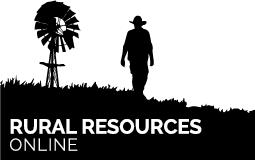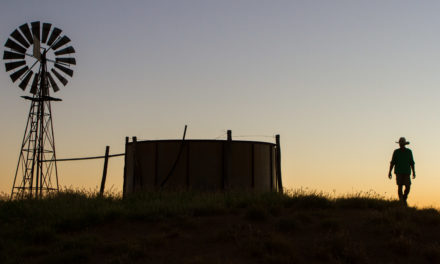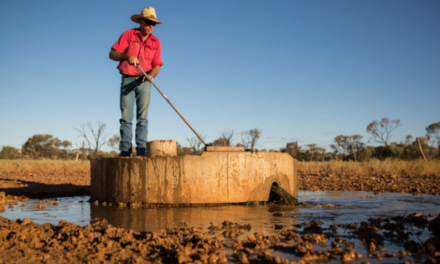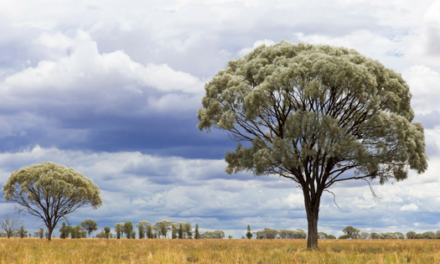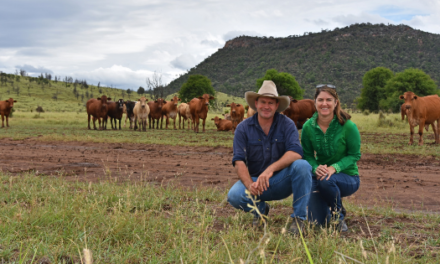Standing in front of a camera to promote the importance of a farm workplace health and safety (WH&S) plan, I started to think what messages we really should be sharing.
There is a lot of money being spent to encourage producers to put together a safety management plan. But if you are doing what you’ve always done it seems a bit unnecessary.
Whatever happened to personal responsibility?
Terms like OH&S and WH&S don’t seem relevant in a family-operated farming business.
If you have no employees then it doesn’t make sense that you need all that paperwork because there is no-one to give it to. Surely common sense should prevail. If only it was that simple.
The human face of farm accidents
In 2012 I was returning with my mother-in-law and children from an outing at another property. Interestingly, we passed an ambulance on our lonely road. It was heading into town. But it did not have its lights or siren on.
I remember commenting that is couldn’t be a bad call out because it was not speeding. And wasn’t that good? I dropped my mother-in-law home. My husband was standing in the carport waiting for us. In an instant my father-in-law had become another statistic.
The ambulance was empty because the injuries were so severe, a chopper was needed to get him to town. A simple accident in the cattle yards. No-one was at fault.
My father-in-law was following a young bull through the drafting yards when it got spooked and turned to run past him. On the way past it stood on his toe as he was stepping back causing him to fall to the ground and land the wrong way. He was knocked out and, with no other injuries, there seemed to be hope.
What we did not know until later was that his fall broke his brain stem. This man was a father, grandpop, brother, neighbour, friend and much more.
The impact of accidents on farms
We were grieving. But there was another family also suffering. You see the accident did not occur on our property. It was school holidays and our neighbour’s family were all down at their yards.
Everyone of them witnessed the incident. They had to perform the initial first aid. Other neighbours were called up to help make contact with the emergency services. Word was spreading. The ripple became a wave.
But dealing with the grief was just the start.
Legally identifiable duty of care for Landholders
My husband was interviewed by the police at the hospital and said it was simply a tragic accident but not in any way the fault of our neighbours. Officially this was still a workplace accident. Our neighbours were investigated and asked to prove their commitment to safety on their property.
Fortunately, they had a Workplace Health and Safety Manual. It didn’t mean they were not visited by Farm Safety officers and their systems reviewed, but it did mean the process was a lot easier than it could have been.
Remember, they were grieving too. Imagine if they didn’t have a WH&S plan for their farm…
The potential cost of a WH&S accident on a rural property
In rural workplaces people use various plant and machinery and undertake activities that may cause death, serious injury or disease. Australian farms are often run by families. Accidents can therefore be especially traumatic.
Landholders can be fined, have civil action taken against them and potentially lose their farm. Financial loss is one thing. Losing a member of your family or community is devastating.
Ask yourself how would your family cope if you were killed or injured?
Not long after my father-in-law died my husband broke his neck when he rolled a four-wheeler mustering. We had planned for the worst and he had an accident policy that paid him a wage while he recovered.
Accidents and injuries are not popular topics. We all like to think we are invincible. Unfortunately nothing is guaranteed.
Demonstrating your commitment to farm safety
You must provide a safe environment for your family, staff, contractors and any visitors to your property. The codes of practice for rural industries apply to anyone who is legally identifiable as having a duty of care.
So you may not have any staff but you do interact with other people. Any one of them (or you) could have an accident on your property.
Every rural workplace should have documented WH&S procedures and policies. The legislation has been around for a long time. It is not possible to feign ignorance when things go wrong and then expect a positive outcome.
While documented procedures are recommended, there are other, simple things that can be done. A diary is an invaluable management tool. Safe work instructions, notes on repairs to be done or comments about conversations all help to prove your commitment to safety.
Training registers and current first aid certificates are other good examples of how farmers can demonstrate their compliance with WH&S legislation. Accidents are not planned or intended events. Unfortunately the odds are not good. It makes sense to plan.
